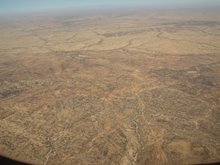This document constitutes the final legal stripping of almost all autonomy from both NGOs and INGOs, the main humanitarian actors in Sudan. HAC officials, many of which are believed to be internal security agents, will now be involved in the vetting of all reports, programming, and hiring. They will even be providing the maintenance engineers for humanitarian communications equipment.
There is supposedly a workshop held by HAC in Khartoum to discuss these procedures tomorrow 13 Feb. But this discussion will be pointless - no NGO can object forcibly to these procedures without risking their programming, staff and registration.
8.1 Recruiting Procedures of National Staff:
- Approval of HAC.
- Approval of Labor Dept. (LD) to advertise for the position in local newspapers.
- Payment of the advertisement fees.
N.B.:
All the above mentioned steps take only one day time.
Advertisement time limit takes 10 to 15 days.
The advertisement should specify clearly position’s duties, responsibilities, qualifications and the necessary logical experience etc).
- Applications should be only received by the Labor Dept. (LD) at HAC.
- Preparation of preliminary short list jointly by both Labor Dept. and the organization within one day time.
- Written test within two days time.
- Oral interview and determination of both the successful candidate and the reserve candidate if there any through a joint panel including one member from each of the following:
1. Labor Dept.
2. NGO general Directorate.
3. The concerned NGO.
4. Procedures Technical Dept.
The selection process takes only one day time based on the readiness of the organization to follow the above mentioned steps unless agreed by the joint panel for going into any further steps.
16. Procedures for Conduction of Surveys and Field Assessments:
All NGOS who are going to carry out any Surveys or field Assessments at either federal or state levels should apply the following procedures:
• The surveys/ field Assessments must be directly related to the nature and field(s) of the NGO work
• Involvement of the related technical Governmental department at federal and state levels within the whole process.
• Involvement of the related Governmental Bodies in writing of the survey final reports results and findings
• Unless approved by HAC, release of the survey findings and results is totally prohibited.
13. Procedures of Media Delegation and Media
Coverage:
· A letter from the organization which includes details and purpose of Media
Delegation.
· The organization shall undertake in writing that the Media Documentary Materials shall be only for humanitarian purposes and not for commercial or any other purposes.
· Approval by the External Information Department, Ministry of Information.
· Submission of copy of the concerned document to HAC prior to any release for approval.
· Written approval of the documentary material by HAC before any further step for the release.
